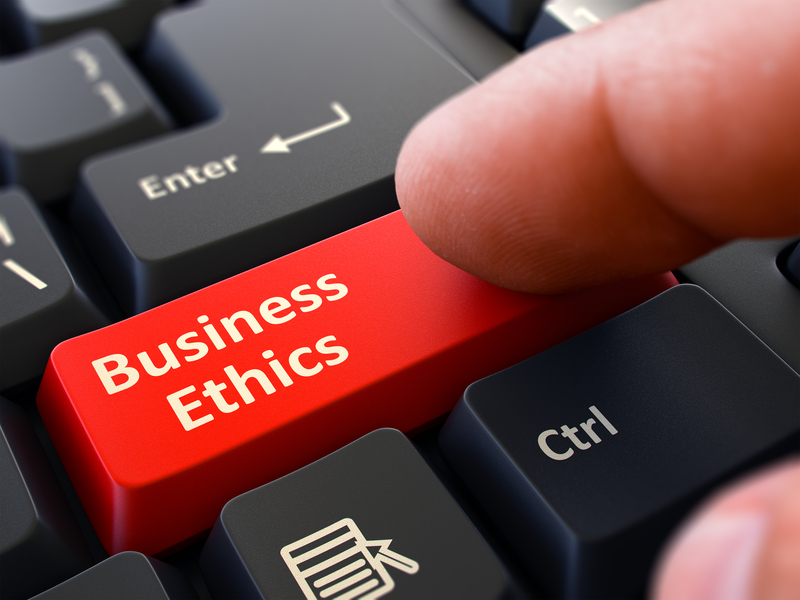Today America inaugurates a new president; ending what, by many accounts, is one of the most contentious and uncivil presidential campaigns in history. It’s a good time to reflect on the subject of leadership as it relates to both business and personal actions. Bill Boulding (@BillBoulding), Dean of Duke University’s Fuqua School of Business, writes, “Business leaders make decisions each day: big and small, positive and negative. All of them affect employees, customers, shareholders, communities, and even society as a whole. To make these decisions in moral and ethical ways, I believe we must adapt the essential qualities of a leader. Successful leaders today and in the decades to come must possess triple-threat leadership capability: IQ+EQ+DQ. In other words, they must possess a combination of two familiar attributes — intellect and emotional intelligence — and one that I believe must be recognized and elevated: decency.”[1] He adds, “A decency quotient, or DQ, … implies a person has not only empathy for employees and colleagues but also the genuine desire to care for them. DQ means wanting something positive for everyone in the workplace and ensuring everyone feels respected and valued. DQ is evident in daily interactions with others. DQ implies a focus on doing right by others.”
Ethical Principles for Business Executives
Whether fair or not, successful business leaders are often perceived as ruthless. The late American professional baseball player, manager and coach Leo Durocher was infamous for stating, “Nice guys finish last.” He was not above using every trick in the book to guarantee success on the field. Such attitudes leave the widespread impression is success and fair play are antithetical. The Economist notes, however, “In 1969 [Durocher’s] Chicago Cubs had a big lead in the closing weeks of the season, but he so alienated his squad (and the umpires) that the team failed to make it to the World Series. In his case, nasty guys finished behind.”[2] The magazine goes on to review a book by author David Bodanis entitled The Art of Fairness. The magazine notes, “The core message in his book, ‘The Art of Fairness’, can be found in the subtitle: ‘The power of decency in a world turned mean’.” The article goes to discuss several examples and counter-examples of decent and not-so-decent business leaders. Bodanis’ conclusion is that, when fairness is applied with skill, decency can prevail. Staff members at the Josephson Institute of Ethics drew up a list of ethical principles they believe incorporate the characteristics and values that most people associate with ethical behavior. They are:
1. HONESTY. Ethical executives are honest and truthful in all their dealings and they do not deliberately mislead or deceive others by misrepresentations, overstatements, partial truths, selective omissions, or any other means.
2. INTEGRITY. Ethical executives demonstrate personal integrity and the courage of their convictions by doing what they think is right even when there is great pressure to do otherwise; they are principled, honorable and upright; they will fight for their beliefs. They will not sacrifice principle for expediency, be hypocritical, or unscrupulous.
3. PROMISE-KEEPING & TRUSTWORTHINESS. Ethical executives are worthy of trust. They are candid and forthcoming in supplying relevant information and correcting misapprehensions of fact, and they make every reasonable effort to fulfill the letter and spirit of their promises and commitments. They do not interpret agreements in an unreasonably technical or legalistic manner in order to rationalize non-compliance or create justifications for escaping their commitments.
4. LOYALTY. Ethical executives are worthy of trust, demonstrate fidelity and loyalty to persons and institutions by friendship in adversity, support and devotion to duty; they do not use or disclose information learned in confidence for personal advantage. They safeguard the ability to make independent professional judgments by scrupulously avoiding undue influences and conflicts of interest. They are loyal to their companies and colleagues and if they decide to accept other employment, they provide reasonable notice, respect the proprietary information of their former employer, and refuse to engage in any activities that take undue advantage of their previous positions.
5. FAIRNESS. Ethical executives and fair and just in all dealings; they do not exercise power arbitrarily, and do not use overreaching nor indecent means to gain or maintain any advantage nor take undue advantage of another’s mistakes or difficulties. Fair persons manifest a commitment to justice, the equal treatment of individuals, tolerance for and acceptance of diversity, the they are open-minded; they are willing to admit they are wrong and, where appropriate, change their positions and beliefs.
6. CONCERN FOR OTHERS. Ethical executives are caring, compassionate, benevolent and kind; they like the Golden Rule, help those in need, and seek to accomplish their business objectives in a manner that causes the least harm and the greatest positive good.
7. RESPECT FOR OTHERS. Ethical executives demonstrate respect for the human dignity, autonomy, privacy, rights, and interests of all those who have a stake in their decisions; they are courteous and treat all people with equal respect and dignity regardless of sex, race or national origin.
8. LAW ABIDING. Ethical executives abide by laws, rules and regulations relating to their business activities.
9. COMMITMENT TO EXCELLENCE. Ethical executives pursue excellence in performing their duties, are well informed and prepared, and constantly endeavor to increase their proficiency in all areas of responsibility.
10. LEADERSHIP. Ethical executives are conscious of the responsibilities and opportunities of their position of leadership and seek to be positive ethical role models by their own conduct and by helping to create an environment in which principled reasoning and ethical decision making are highly prized.
11. REPUTATION AND MORALE. Ethical executives seek to protect and build the company’s good reputation and the morale of its employees by engaging in no conduct that might undermine respect and by taking whatever actions are necessary to correct or prevent inappropriate conduct of others.
12. ACCOUNTABILITY. Ethical executives acknowledge and accept personal accountability for the ethical quality of their decisions and omissions to themselves, their colleagues, their companies, and their communities.
It’s an excellent list of attributes and any leader adopting those attributes will have a high DQ. If a business is going to be ethical, every employee, from the CEO down, needs to embrace the ethical principles suggested by Josephson Institute of Ethics.
Business ethics
Kathleen Conroy from the Edward Lowe foundation asserts, “Good ethics make good business sense. Your company stands to profit from a reputation for acting with honesty and integrity.”[4] Conroy suggests business leaders ask themselves a series of questions before making a decision: Is it legal? Would I be violating federal, state or municipal law? Is it in accordance with company policy? Is it fair? Would anyone lose out? Would I be proud of my action? How would I feel if my family and friends read about it on the front page of the newspaper? How would our customers react? Would they be more inclined to trust us, or feel cheated or betrayed? Although most businesses publish a code of ethics, it’s meaningless unless employees see actions befitting the words. Alexandra Twin reports, “Published by the Ethics & Compliance Initiative (ECI), the Global Business Ethics Survey of 2019 surveyed over 18,000 employees in 18 countries about different types of misconduct they observed in the workplace. Thirty percent of the employees surveyed said they had observed misconduct, with 21% saying they had observed conduct they would categorize as abusive, intimidating, or creating a hostile work environment. Sixty-five percent of employees said they reported the misconduct they observed. When questioned if they had experienced retaliation for reporting, 40% said they had been retaliated against. Indeed, fear of retaliation is one of the major reasons employees cite for not reporting unethical behavior in the workplace.”[5]
Cindy Phillips notes, “Striving to earn a reputation as an ethical business is noble, but it requires commitment. Most businesses are financially driven, and it is possible to be both ethical and successful.”[6] She suggests ethical businesses demonstrate six characteristics: 1) Demonstrate strong, ethical leadership; 2) Have a core value statement; 3) Adhere to principles of integrity and fairness; 4) Respect employees and customers; 5) Foster loyal relationships with employees and customers; and, 6) Demonstrate concern for people and the environment.
Concluding thoughts
Boulding concludes, “If business can become more intentional about decency, I believe it can become a healing force our world so badly needs. It can begin to rebuild the trust that corporations have lost with employees and customers. It can be the model for how people who are very different come together to work with common purpose. It can help solve some of the world’s toughest problems by uniting people to find solutions. But for decency to win the day, DQ must be recognized as an essential quality in leadership. Intellect and emotional intelligence are vital, but it is decency that ensures IQ and EQ are used to benefit society, not tear it down.” We need more ethical leadership in both business and politics as we emerge from the pandemic and try to create a better world for everyone.
Footnotes
[1] Bill Boulding, “For Leaders, Decency Is Just as Important as Intelligence,” Harvard Business Review, 16 July 2019.
[2] Staff, “Why fair play pays,” The Economist, 10 December 2020.
[3] Staff, “12 Ethical Principles for Business Executives,” Josephson Institute of Ethics, 12 December 2010.
[4] Kathleen Conroy, “Why You Need Good Business Ethics,” Edward Lowe Foundation.
[5] Alexandra Twin, “Business Ethics,” Investopedia, 1 July 2020.
[6] Cindy Phillips, “Six Characteristics of an Ethical Business,” Chron, 1 February 2019.





